
Thursday September 23, 2021
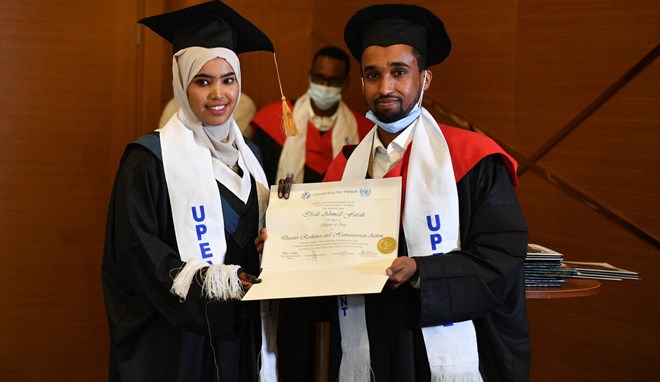
Mogadishu – Coinciding with the International Day of Peace, a group of Somali students today graduated with master’s degrees in subjects with special relevance to peacebuilding in Somalia – and were encouraged to channel their learning towards the betterment of their country.
“The degree certificate I have received today is important and will assist in state-building for my country and the Somali People. I wish to apply the knowledge I have gained to advocate for good governance and contribute to the proposed Somali constitution,” said Fathiya Mohamed Abdullahi, a Benadir resident who received a Master of Arts in International Law and Human Rights.
Ms. Abdullahi was one of 76 students – including 14 women and 62 men hailing from around the country – who made up the first cohort of students to graduate with degrees from the University of Peace’s specialized Somalia programme.
“I am happy to apply the skills and knowledge I have acquired from the University of Peace into my day-to-day activities since I work with international non-governmental organizations, and particularly in the same sector, which is disaster resilience and leadership in different parts of Somalia,” said Mohamed Abdi Hussein, from Galmudug and the recipient of a Master in Arts in Disaster Resilience and Humanitarian Affairs.
Based in Costa Rica, the University of Peace was established by the United Nations General Assembly in 1980. Its areas of focus include conflict-prevention, human security, human rights, environmental security and post-conflict rehabilitation.
Today’s event was attended by the university’s Dean, Professor Juan Carlos Sainz-Borgo, and attendees included the UN Secretary-General’s Special Representative for Somalia, James Swan; Somalia’s State Minister of Education, Abdirahman Mohamud Abdule; and Somalia’s Minister of Agriculture, Said Hussein Iid, himself a graduate of the university.
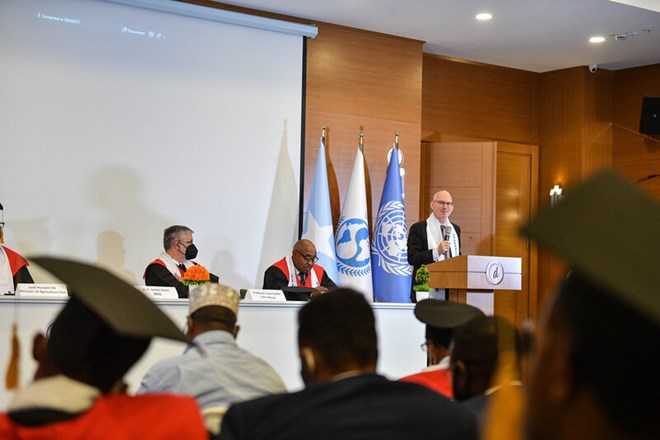
Contributing to Somalia
The cohort’s members graduated with Master of Arts degrees in the following subjects: Peace, Governance and Development; Disaster Resilience and Humanitarian Affairs; International Law and Human Rights; and Environment, Development and Peace.
In his remarks at the graduation ceremony, the UN Special Representative welcomed the university’s inclusion of Somalia in its outreach for higher education opportunities in Africa and encouraged the graduates to give back to their communities.
“I note also that among the programmes available through the [University of Peace] are in a number in areas that are highly relevant to the needs of Somalia,” Mr. Swan said. “And so I am sure that those of you who have been studying these different topic areas have much to contribute to the country, to your families and to your communities as you go forward.”
“It is what you learn; it’s what is in your brain; it is what is inside you. But if it really is going to have impact, it needs to be shared in your communities, shared with your fellow countrymen and women, to move the country forward,” he added.
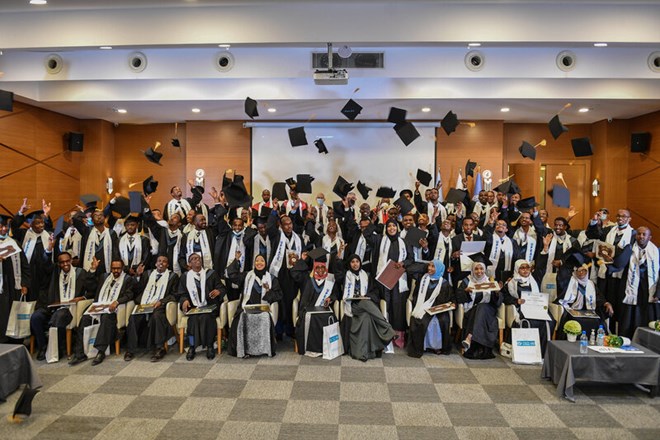
Commitment to Somalia
Addressing the ceremony, Professor Sainz-Borgo said the university had designed country- and region-specific programmes aimed at addressing challenges to peace in Africa, and that Somalia had warranted special attention.
“Considering the monumental challenges facing Somalia, it was necessary to implement more programmes. However, the UPEACE [University of Peace] opted to focus on four key areas which we believed will contribute to Somalia’s post-conflict agenda,” he noted.
On his part, Professor Samuel Kale Ewusi, who specializes in peace studies and international relations and serves as the director of the university’s Africa Regional Programme, highlighted the institution’s commitment to the Horn of Africa country.
“We are in for the long-run to accompany the people of Somalia in dealing with the challenges of development, the challenge of security and the challenges of building the necessary human capital that is required to develop this country,” he said.
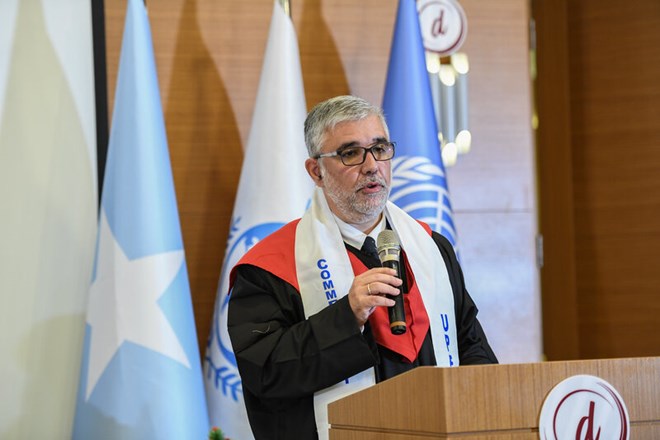
Helping students
According to the university, in recognition of the social and economic difficulties that female and other students in Somalia can face in paying for education fees and in an attempt to make its courses as widely accessible as possible, its tuition fees for Somali students is the lowest of all its programmes worldwide, while still maintaining academic standards. It also provides substantial waivers and for certain students it covers some costs.
Of those who qualified its Africa Programme in Somalia, five students were enrolled on scholarships from the government. Applicants hailed from a wide variety of backgrounds, including local and international non-governmental organizations, private sector, government and civil servants.
The teaching has not been immune to the impact of the COVID-19 pandemic, with the university’s Somalia programme now adapted to online classes.
The university has another two other cohorts, totaling 250 students, who will graduate in the academic year of 2022-2023. But prior to its Somalia programme, it had many Somalis attending the university, including many graduates who now work in Somalia’s political and government spheres, as well as in civil society and the country’s diplomatic corps – a point referred to by the State of Minister of Education in his remarks today.
“We believe that you will use the knowledge you have gained to positively advance the Somali community. I know a number of alumni of this university who are businesspeople, public servants and politicians. We want you to lead our people on the right path when you return to the communities,” Minister Abdule said.
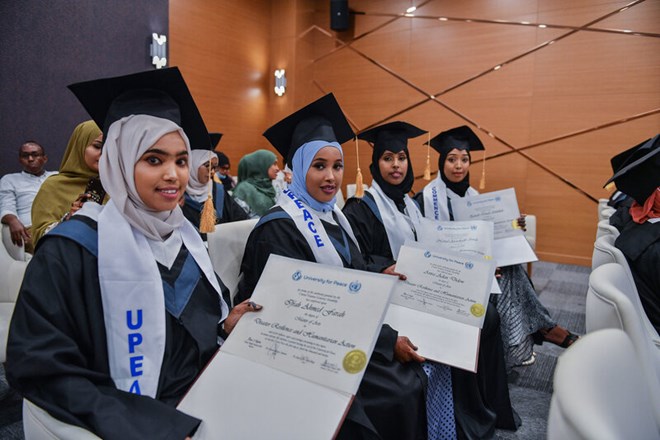
Peace day
Today’s graduation ceremony was timed with the International Day of Peace, which the UN General Assembly established in 1980 as a day devoted to strengthening the ideals of peace, through observing 24 hours of non-violence and cease-fire.
At the ceremony, the guests and graduates took part in a declaration of solidarity and dedication to strengthening ideals of peace, non-violence and ceasefire in Somalia and the rest of the world.